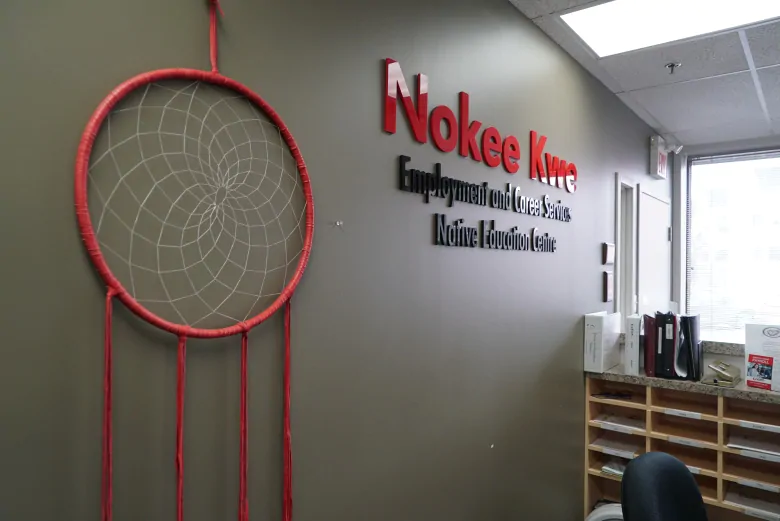A London program that turns Indigenous women into warriors needs a financial lifeline

A game-changing program for Indigenous women is in jeopardy thanks to cash crunch. Staff at Positive Voice program are looking for a new financial lifeline to continue their work turning peoples’ lives around.
The program at London’s Nokee Kwe Native Education Centre has been turning wall flowers into warriors since 2016. The seven-week course teaches women to overcome trauma, find self-confidence, get an education and embark upon a career to take control of their lives.
Now the program is in jeopardy after a one-time, two-year, $216,500 grant from the Ontario Trillium Foundation that has run its course.
“It’s heart breaking and sad. It’s discouraging,” said Mina Antone, a graduate of Positive Voice. “This program that was put together has helped so many people like myself.”
Antone found the program two years ago, when her life was at a major crossroads. She had just fled an abusive relationship. Her mother and a sister had died in a house fire. Antone was looking for a fresh start for herself and her three children.
“Before the program I was pretty depressed,” she said.
At first Atone wasn’t sure what to make of the course. So she sat in the back of class and listened to the others share their stories.
“I could relate to a lot of them,” she said. “They were going through the same things I was going through.”
The scale and scope of violence against Indigenous women
The reason Antone could relate is because violence against Indigenous women and girls in Canada happens on a scale and severity much higher than their non-Indigenous counterparts.
According to federal Department of Justice statistics from 2014, Indigenous women and girls are three times more likely to be sexually assaulted than non-Indigenous females.
Indigenous women and girls are also far more likely to experience domestic violence. While three per cent of non-Indigenous women reported being assaulted by a current or former spouse, among the Indigenous population that number is 10 per cent.
With hundreds of unsolved cases of missing or murdered Indigenous women in Canada, police are overwhelmed and under resourced to do much about it.
Teaching women how to lower their defences

It’s not easy being an Indigenous woman in this country, which is something that became plainly obvious to Mina Atone as she sat quietly listening to the other women from the back of her Positive Voice class.
She learned she wasn’t alone and she opened up because she realized for the first time, her story mattered.
“I started to become more confident in myself. I started to take chances and make mistakes and have a little more faith in myself.”
Two years later, Atone is a teacher. She teaches Oneida language classes at both Nokee Kwe and H.B. Beal Secondary School.
“It’s always been a dream of mine,” she said, wiping away tears. “After going through this program and finding the confidence to move forward, I became one of those great people at the front of the classroom.”
How they turn lives around

The trick turning the lives around of women like Mina Atone to “break down their walls,” according to Danielle Hill. Hill is not just a graduate of the program herself, she now works as one of its facilitators.
Those walls have been built up by women over many years because many of feel as if they are under siege from all sides with fear of a violent spouse, other women – even the authorities.
She said most Indigenous women don’t even realize they’re doing it.
“We’re just so used to having things taken away from us, like losing our children with one call,” she said. “It may not even be true what people are saying but there’s still that fear that we may have our children taken by [the Children’s Aid Society].”
“We’re used to having to protect everything we have,” she said.
Once women realize that Positive Voice is a safe space, they lower their defenses and learn they don’t have to go on struggling alone.
They can go to the group with their problems, help other women in their community and find strength as role models for women and girls in their family.
It helps end cycles of violence, abuse and fosters a sense of independence, something Mina Antone is trying to teach her daughter Natasha.
“She’s 13 and she said to me ‘mom, people don’t get to live the dream and there’s no chance for anything great to happen’ and it kind of upset me because there’s always hope.”
“So I looked at my daughter and I told her, ‘you can’t sit there and say there’s no hope and nobody gets to live live their dream because I am living the dream.”
“I didn’t think I was ever going to and here I am,” she said. “People can do remarkable things, as long as they have faith in themselves.”
Hill said that faith is what she and other organizers of Positive Voice are trying to keep in mind as they look for a financial lifeline, something that’s crucially needed if they want to keep changing lives like Atone’s for the better.
She said hopefully they can find the money to not just continue the program, but expand it.
“We want to see this evolve. We have so many ideas moving forward,” she said. “We just have no money to do it.”





